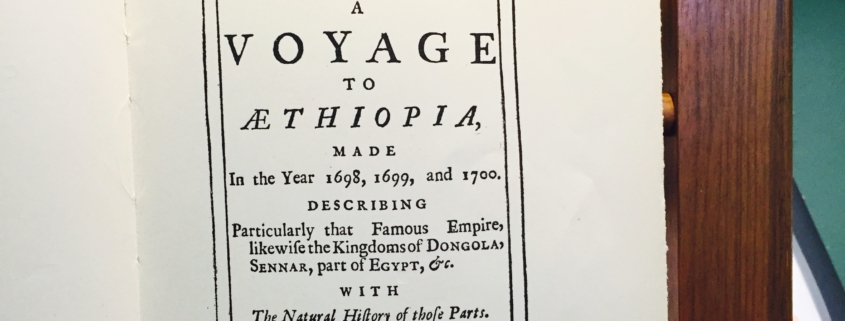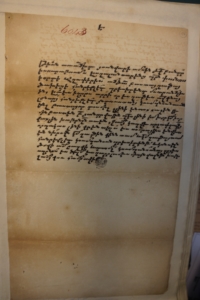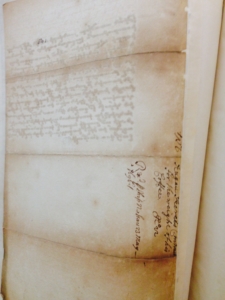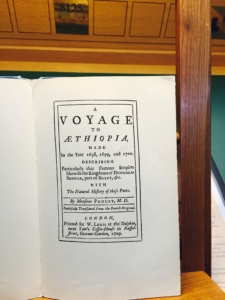Agha Piri Calendar, a ship-owning Coffee merchant in Surat
May 1, 2015
I had to scratch my head several times while reading this document and have finally managed to crack it, albeit provisionally. It is a commercial document drawn up in Surat (India) in the mid-1690s by a famous Julfan-Armenian merchant Aghapiri Calendar (son of Coja Panos Calendar/Ghalandarian who signed a 1688 Agreement between the Armenian “nation” and the East India Company, and business tycoon in his own right who was the owner of the “Quedah Merchant” the ship seized by the pirate Captain Kidd in 1698). From the linguistic angle the document is fascinating because of the large dose of usual Persian/Arabic/Turkish/Hindi words but also unusually some bizarre English words or expressions that took me the longest to figure out. From the economic history angle, it furnishes proof that silk, gems, calico textiles, and silver were not the only commodities Julfan merchants handled. Some Julfans were also involved in the coffee trade between the Red Sea, Surat, and European cities such as London. This trade was in full bloom in the last quarter of the seventeenth century when coffee was all the rave in London before being displaced by tea. As this document suggests, the scale of this trade was not at all on the level of the peddler. In this case, Aghapiri is on record having sold 181 sacks or bags (each sack weighing about 224 pounds or 2 hundredweights). In other words, the transaction here is for approximately 40,000 pounds of coffee that Aghapiri probably had shipped from Mocha by his agents there.
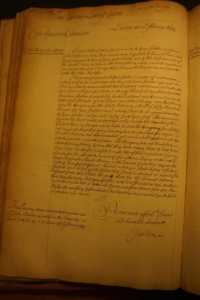
John Chardin’s letter of Credit for 50,000 pounds sterling drawn on Agha Piri Calendar of Surat, 20th February, 1690/1. The anount is approximately worth a little short of $8,00,000 in today’s currency
Source: BL, IOR/E/3/92 f. 76v : 20 Feb 1691
CAVEAT OR NOTE: The transcription and translation are provisional.
Է
Թիւն առճխդ [1144+552=1696] յունվարի ամսին ժգ [13] բանդարի սուրաթումս ես ղալանտարէնց պարոն փանոսի որդի Աղափիրս աճձա [181] բաստայ ղաֆայ ծախեցի հանրէբլէդ պրէսիդէնդ մստրանճլիսին [i,e., Samuel Annesley], եւ էս ղարարս [قرار qarār] ար[ա]րի որ էս ղաֆէս ա[ստուծո]վ գնայ լօնտր[ա]յ հանրէբլէդ յնդուստան[ա]յ Կումպ[ա]նուն տունն ինչ բաստայոր դամիչ [<E. Damage] չլինի էնտոք քաշեն թէ մին բաստէն Բ [2] յանդրվաթէն [hundredweight]* պակաս լինի իմ Խօր կ[ա]մ իւր վաքլին խաթրնշան առէն, ջամայ կապվե որչափղաֆայ որ պ[ա]կ[ա]ս լինի գրեն տեղս ես սուրայթս էն վախտ էն նախարովն կամ ղաֆին գինն տամ կ[ա]մ ղաֆայտամ հանրէբլիդ կումպանուն պրէսիդէնթ եւ կոնսէլն ծօվի ամենայն ըռզգի [<E. Risk] եւ դամաչ կումպանունայ զրայէս [زیرا zīrā, Because, on account of, since] ապրանքս ես ծախելամ էս ղարարլամէս միայն վազնին՞՞ [??A وزن wazn (v.n.), Weighing exactly weighing out (to anyone) money, telling (it) by just weight] խաթրջամայ գու [??] համար տվի
In the Name of God
“In the year 1696 on 13 January in this port of Surat, I Aghapiri the son of Baron Panos of the Ghalandar family [i.e., Coja Panos Calendar of London] sold 181 sacks of coffee to the President of the Honorable East India Company, Mister Annesley [literally Anchli] and wrote this agreement that this coffee may be shipped [literally “may go”] with God’s help to London to the Honorable East India Company House and that whatever sacks that are not damaged they should take and that if one sack happens to be less than two hundredweights [i.e., 224 pounds], they should point it out to my father or his designated representative so they can write to me here in Surat. At that time, I will either pay the price of the missing coffee or give the difference in coffee to the president of the honorable company and the Council. All risk and damage on the sea are covered by the Company, on account of which I have given this letter of agreement only to establish the just weight [of the goods].
*Definition of ‘Hundredweight – Cwt’
“A unit of measurement for weight used in certain commodities trading contracts. In North America, a hundredweight is equal to 100 pounds and is also known as a short hundredweight. In Britain, a hundredweight is 112 pounds and is also known as a long hundredweight.
Addendum May 1, 2015:
The French voyager, Charles Jacques Poncet, who travelled to Abyssinia and back from Cairo in 1698, alludes to our merchant in at least one instance in his travelogue. After praising the Abyssinians and their country, he writes that the English (here he probably means the English East India Company and its factories or settlements in India) “are also desirous of making alliance with the AEthiopians, and to my knowledge an Armenian merchant did associate himself to the English in hopes to trade thither; which would be of great advantage to them, for besides gold, civet, elephants’ teeth, &c., they would bring thence aloes, myrrh, cassia, tamarinds, and coffee; which the Ethiopians do not esteem much, and which (as I have been told) was transported out of AEthiopia into Hiemen [i.e., Yemen] or Arabia Felix, from whence the merchants nowadays bring it, for at present they cultivate it in AEthiopia only as a curiosity.” Poncet later names this merchant as “Agapyri” or “Agappri” who is obviously the same Agha Piri Calendar, the author of the above coffee-related commercial document found in an IOR document in the British Library.


